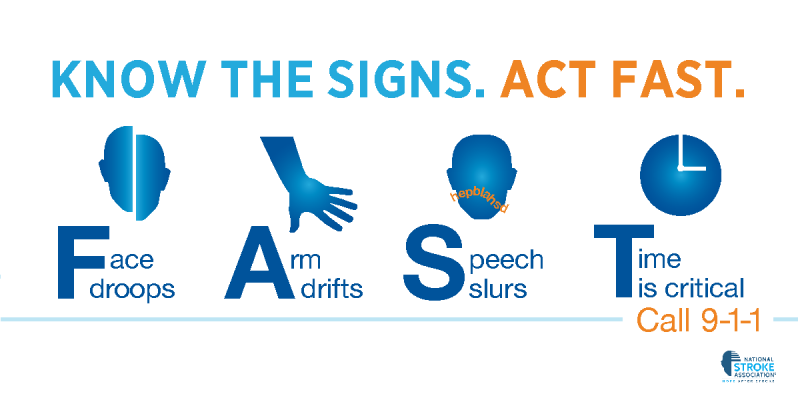If you observe any of the signs below, DO NOT WAIT and DO NOT FALL ASLEEP. Call 911 and seek immediate treatment.
Stroke occurs when a blood vessel that carries oxygen and nutrients to the brain is either blocked by a clot or bursts.
Characteristics That Increase Risk for Stroke
You can't change your family history, but knowing your family's health history can help you know your risk for stroke and take steps to prevent stroke. Family members share genes, behaviors, lifestyles, and environments that can influence their health and their risk for disease. Stroke risk can be higher in some families than in others, and your chances of having a stroke can go up or down depending on your age, sex, and race or ethnicity. The good news is you can take steps to prevent stroke. Work with your health care team to lower your risk for stroke.
- Genetics and Family History
When members of a family pass traits from one generation to another through genes, that process is called heredity. Genetic factors likely play some role in high blood pressure, stroke, and other related conditions. Several genetic disorders can cause a stroke, including sickle cell disease. People with a family history of stroke are also likely to share common environments and other potential factors that increase their risk. The chances for stroke can increase even more when heredity combines with unhealthy lifestyle choices, such as smoking cigarettes and eating an unhealthy diet.
- Age
The older you are, the more likely you are to have a stroke. The chance of having a stroke about doubles every 10 years after age 55. Although stroke is common among older adults, many people younger than 65 years also have strokes.
- Sex
Stroke is more common in women than men, and women of all ages are more likely than men to die from stroke. Pregnancy and use of birth control pills pose special stroke risks for women.
- Race or Ethnicity
Blacks, Hispanics, American Indians, and Alaska Natives may be more likely to have a stroke than non-Hispanic whites or Asians. The risk of having a first stroke is nearly twice as high for blacks as for whites. Blacks are also more likely to die from stroke than whites are.
Behaviors That Increase Risk for Stroke
Your lifestyle choices can affect your chances of having a stroke. To lower your risk, your doctor may suggest changes to your lifestyle. The good news is that healthy behaviors can lower your risk for stroke.
- Unhealthy Diet
Diets high in saturated fats, trans fat, and cholesterol have been linked to stroke and related conditions, such as heart disease. Also, getting too much salt (sodium) in the diet can raise blood pressure levels.
- Physical Inactivity
Not getting enough physical activity can lead to other health conditions that can raise the risk for stroke. These health conditions include obesity, high blood pressure, high cholesterol, and diabetes. Regular physical activity can lower your chances for stroke.
- Obesity
Obesity is excess body fat. Obesity is linked to higher "bad" cholesterol and triglyceride levels and to lower "good" cholesterol levels. Obesity can also lead to high blood pressure and diabetes.
- Too Much Alcohol
Drinking too much alcohol can raise blood pressure levels and the risk for stroke. It also increases levels of triglycerides, a form of fat in your blood that can harden your arteries.
- Tobacco Use
Tobacco use increases the risk for stroke. Cigarette smoking can damage the heart and blood vessels, increasing your risk for stroke. The nicotine in cigarettes raises blood pressure, and the carbon monoxide from cigarette smoke reduces the amount of oxygen that your blood can carry. Even if you don't smoke, breathing in other people's secondhand smoke can make you more likely to have a stroke.

